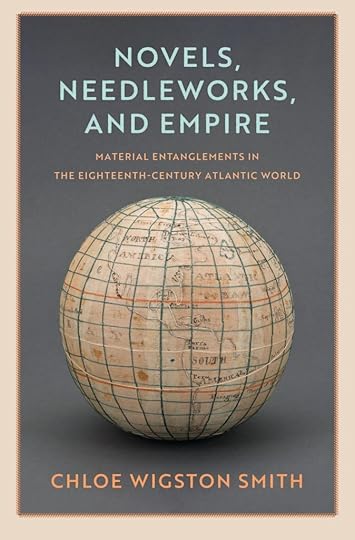Nichole Louise's Blog, page 6
March 26, 2024
JAR Review: Novels, Needleworks, and Empire: Material Entanglements in the Eighteenth-Century Atlantic World by Chloe Wigston Smith
March 18, 2024
Review: Black Sun by Rebecca Roanhorse
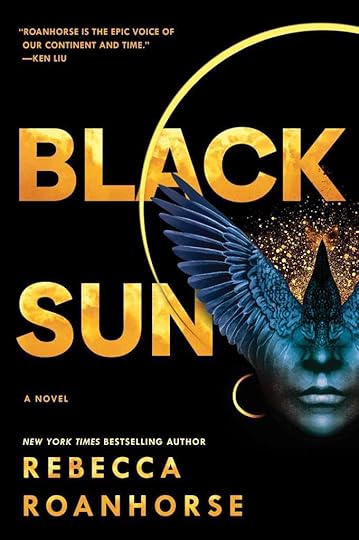
Black Sun by Rebecca Roanhorse is a fantasy tale set in a world heavily influenced by pre-Columbian cultures. Four great clans reside in the holy city of Tova: Golden Eagle, Water Strider, Winged Serpent, and Carrion Crow. It is the Carrion Crow from which Black Sun‘s story has its genesis, beginning with a young boy named Serapio who is effectively unwillingly made into an avatar of the Crow god. Years later, we meet Serapio as a man–hidden for years and grown more powerful through training in hand to hand combat, shadow magic, and far seeing through crows. Serapio journeys across the Crescent Sea in time for the Conjunction (eclipse,) back to Tova to fulfill a prophecy. Xiala is the captain of the ship, an interesting character herself in her “Teek” race. She has rainbow eyes and the ability to perform magic to control wind and water through Song. Xiala and Serapio form a unique friendship, their cultures and histories clashing in unexpected ways.
In Tova, the Sun Priestess of the Celestial Tower Naranpa resists being usurped by those born to the Golden Eagle clan. They view Naranpa as unworthy of her station due to her birth origin of “Dry Earth” in the “Maw” – the lowest part of the city where people live among poverty, darkness, and underworld crime syndicates. Also in Tova, we meet Okoa, son the late Carrion Crow matron, who is recalled home to deal with the rising tensions between the clans in a city about to explode like a powder keg.
Rebecca Roanhorse has created a fully realized world, creatively drawing in aspects of MesoAmerican cultures, such as the use of cacao as a trading item. Roanhorse has successfully balanced apt world building while fleshing out her cast of characters. I particularly loved Xiala and Serapio. While we might be supposed to view Serapio as a “villain” in this story, he is crafted in a way that makes him sympathetic which makes him all the more complex and interesting. I also loved the relationship between him and Xiala. The Teek race and culture seems fascinating and I hope we learn more about them in the other books! Another world building detail I loved was the giant crows the warriors of Carrion Crow ride. I will definitely be reading the rest of the books in this trilogy.
March 15, 2024
Review: If The Tide Turns by Rachel Rueckert
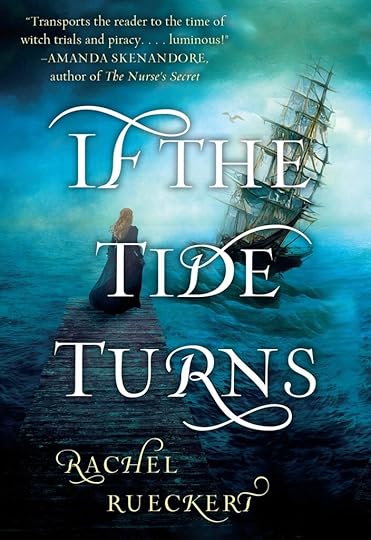
*slight spoilers below*
If The Tide Turns by Rachel Rueckert takes place from 1715 to 1717 at the intersection of Massachusetts Puritanism and the Golden Age of Piracy. If The Tide Turns actually reminded me a lot of Hester. I was really excited to read this one because of the subject matter, and I really wish I had liked it more, which I will get to soon. I first want to acknowledge that this book is a fast read and the short, alternating POV chapters make it a page-turner. I appreciated the early 18th century setting, as well as the blending of two very different worlds that existed in the same time period and how those two things could clash. I also appreciated the Indigenous characters and the acknowledgment of their struggles with the colonists.
I found If The Tide Turns to be chock-full of tropes: the strong-willed, feisty, progressive-thinking woman (Maria) falls for the no-penny-to-his-name dashing man of the world (Sam) trope (both are based on real people, by the way.) In turn, I found the first half of the book to be quite predictable in its plot. The miscommunication trope was hugely irksome for me, and perhaps the frustrating elements that contributed to the miscommunication fueling much of the plot is what made the story a page-turner, because I just wanted to find out how the situation could be resolved. I was so frustrated with how some characters acted in certain situations. For example, Sam, for all his apparent intelligence and enlightened thinking, never once considers Maria could have gotten pregnant by him?! He never once considers that someone else could have written Maria’s damning letter to him ?!
I also found that there were several instances of chunks of dialogue from characters that seemed to simply exist to provide expository historical facts that the characters themselves might not have even known in full without hindsight. Not to mention, that’s not how most people actually speak. These chunks of dialogue were also full of super progressive views for the time. If you look at my reading history, you know I love outsider stories of people who go against the grain in historical settings–however, Sam and Maria were super 21st century in their views which took me out of the 18th century. Toward the end of the book, there is a sword fight and betrayal on the ship by two different characters who I believe were never mentioned before so there was really no emotional impact in their apparent climactic interactions with Sam because I did not even know who they were.
I found, more often than not, that very important and emotional-scenes happened “off screen,” with major action simply being summarized or skipped over rather than have the reader experience the scene in real time. This style choice is something I’ve disliked in other books, and that’s just my personal view, but I much prefer to experience important things with the characters rather than just be told a summary after the fact. It’s quite jarring and unfulfilling. The ultimate climax/reunion that the entire book had been building up to ultimately fizzled to naught and did not provide the emotional pay off I was hoping for. When the book ended, I actually thought, “wait–what? That’s it?”
I hate to give such a critical review, but I also have to be honest. I think the book could have benefited expanding and letting the plot and characters breathe a bit more instead of skipping over so much. (Although I also understand that many trad-publishing editors want writers to cut cut cut because they think readers don’t want to read [buy] long books.) In all honesty, I really wanted to like If The Tide Turns, but it just continually did not deliver for me.
Should you like to venture into these waters and judge for yourself, the book will be released March 26, 2024.
March 5, 2024
Review: The Baronet’s Tale: Anthony (Jacobite Chronicles) by Julia Brannan
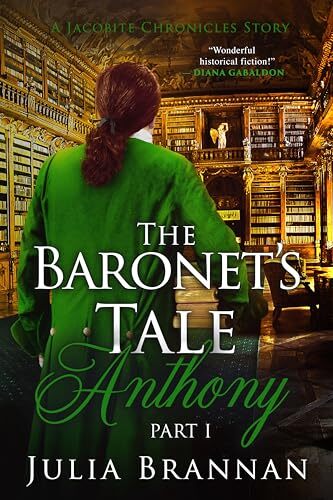
The Baronet’s Tale: Anthony by Julia Brannan is a prequel to the Jacobite Chronicles, but takes place after The Highlander’s Tale which recounts Alex MacGregor’s childhood in the Highlands. The Baronet’s Tale picks up in 1734 with Alex embarking for university in Paris at his father’s insistence. Alex takes on this burden, painful as it is to know he will be away from Scotland and his clan for three or more years. Yet he attends university with the intent to become educated enough to argue for the revocation of his clan’s proscription by the Elector, King George.
Not only does Alex hone is gift of memorization and languages at university, but he also makes fast friends in Ashelle, a free black woman who is a cook at an inn, Jeanne, a prostitue who speaks truth, and Highbury, and Jacobite-sympathizer English lord who is traveling the continent. Highbury takes Alex under his wing as a sort of benefactor not only for him, but also for Ashelle and her mother. Highbury is intent on spending his fortune for good, rather than have it pass to his gambling addict son.
Having read the Jacobite Chronicles, it was interesting to see Alex discover his talent for acting and mimicry in doing plays at school, as well as impressions at the tavern in exchange for coin. Alex observes people of all socioeconomic classes to hone is impressions, some of which are the clear kernels of what will grow into his “Lord Anthony”spy persona in the Jacobite Chronicles. Much seems to work in Alex’s favor in Paris, and his natural leadership and charisma makes him a magnet for those around him. More often than not, Alex is often without flaw which at times can get a little unrealistic, but he is still a fun character to read nonetheless. The first half of the novel was fast-paced and engaging as Alex navigates his new life in Paris, but I felt the middle-near end dragged a bit pacing-wise. Nevertheless, Julia Brannan’s storytelling in the Jacobite series is always a treat.
February 18, 2024
Review: The Secret Diaries of Charles Ignatius Sancho by Paterson Joseph
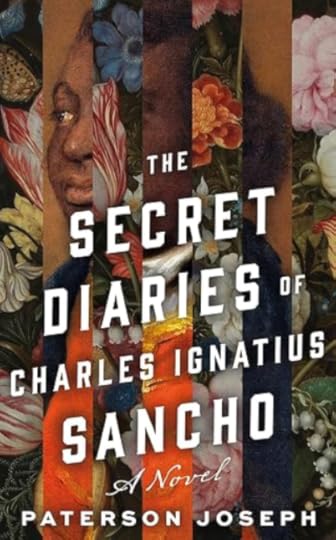
The Secret Diaries of Charles Ignatius Sancho by Paterson Joseph is based on the life of 18th century Ignatius Sancho. Born on and soon orphaned upon a slave ship, two-year-old Sancho is purchased by an Englishman and taken back across the ocean and gifted as a sort of “pet” for three society sisters. Sancho runs from the brutal whims of the Greenwich sisters and befriends the Duke of Montagu, who in turn becomes a type of benefactor and educator for Sancho. Unsure of his “status” as a Black person in London, Sancho traverses the high society of the English while contending with the cognitive dissonance of having a sort of “privileged” life amongst them than he otherwise wouldn’t as an enslaved person on a plantation. Sancho wars with himself upon this dichotomy; the societal issues, nuances, and complexities Paterson presents with Sancho’s situation is interesting and without an answer. What’s more, Sancho himself recognizes he seems to have more education and “society” than the poor whites he comes into contact with, as well as the enslaved Black people he comes across who he at first views with a type of competition but soon realizes his colonized thinking due to his “society” upbringing.
Paterson Joseph’s author note states that he does not sugarcoat Sancho’s story, nor does he have super progressive-thinking 18th century people, and nor is Sancho’s story is one of “trauma porn” of an enslaved person. He expertly balances Sancho’s complex and nuanced standing in the racial and socioeconomic structure of Georgian London. Paterson’s style and novel structure closely echoes an 18th century novel a la Clarissa or Tristram Shandy. Modern readers may find this structure and style a little sluggish at times, however, there is a section of the novel that is all epistolary in letters between Sancho and his soon to be wife and her harrowing accounts of brutal life in the Caribbean.
There are all sorts of interesting nuggets about the real Sancho–he was a composer, writer, shopkeeper, and much more. I encourage everyone to read about the real Sancho, as well as this novel. I wouldn’t be surprised if Paterson Joseph gets a mini-series made out of this tale!
January 29, 2024
Review: The Siege by Helen Dunmore
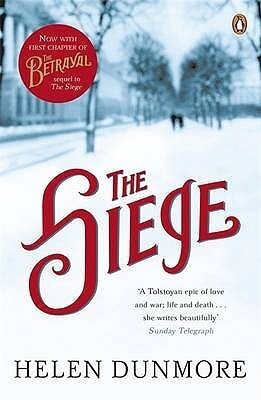
The Siege by Helen Dunmore follows a young woman, Anna, who is thrust into the primary caretaker role for her family during the deadly 1941 Siege of Leningrad. With a [unemployed] writer father and a infant brother, and her mother having passed at her brother’s birth, Anna is the de facto leader of her family. She gets military work to dig tank traps around the city in addition to foraging for food and wood, standing in breadlines, and constantly putting herself in harm’s way to trade for scraps to keep her brother alive.
Anna’s Leningrad apartment is also occupied by former neighbor Marina, who was also a former lover of Anna’s father. Anna eventually meets and takes in Andrei, with whom she forms a romantic bond–yet their time for youthful romance is stunted in the dire circumstance of survival. The interesting dichotomy here is that at a time when young love should flourish and is viewed in a very romanticized way, Andrei and Anna are thrust into very unique situation where they are drawn closer by circumstance and seem to share years of wisdom, experience, and health hardships all in the span of months. War, siege, and starvation accelerate their comfort levels and relationship, as it did with many during such a time and place.
Helen Dumore’s writing is Literary Historical Fiction at its finest. I found myself re-reading sentences simply because of how beautiful and uniquely worded they were, which is not something I often find myself doing while reading. Not only is her prose both delicate and gritty in encapsulating the fleeting beauty and ugliness of life, but she also excels at capturing the desperate, harsh, and unforgiving siege of starvation, freezing cold temperatures, and war.
January 21, 2024
Review: The Oath of Bjorn by Tamara Goranson
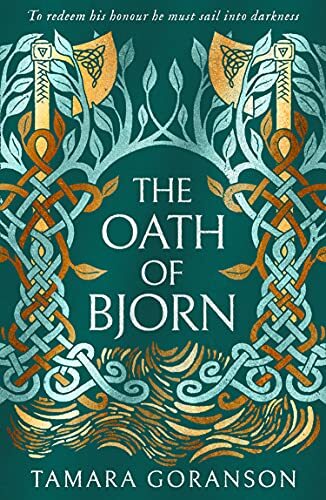
The Oath of Bjorn (book 3 in the Vinland Viking Saga) by Tamara Goranson follows the Beothuk-raised, Norse huntsman husband of Anja Freydisdottir (the main character of book 2,) son of Logatha and the late Finnbogi. Given the female perspectives of books 1 and 2, switching to the male perspective for book 3 was a bit of a worldview change. While I could find myself relating with Freydis and Anja, I could not relate to Bjorn. In fact, I often found myself annoyed and frustrated (even angry with him at the beginning of the book by his treatment of Anja) by his constant inner wrestling with honor and oaths and protecting the women in his life (as we know from the previous book, Anja is very capable,) whereas the women in books 1 and 2 seemed to have very real stakes against them rather than abstract things like honor and oaths. This is not to say, however, that Bjorn is without problems–there is a price on his head.
Bjorn and Anja must leave Leifsbudir with a seemingly untrustworthy Norseman, Karlsefni, to escape the mark of vengeance placed upon Bjorn by Hurritt, his childhood friend turned enemy after the events of book 2. I could understand their need to get away for their own safety but there was something in the way how Bjorn viewed Anja that rubbed me the wrong way (perhaps his drive to always protect her without him acknowledging that she is capable) in that her lack of perspective almost seemed to take her agency away in this story, whereas she was such a strong figure in book 2. The plot plods along a bit in the first half as Bjorn and Anja seem to be constantly on the move for their own safety, yet later find a measure of safety in Karlsefni’s village–yet it is at the price of their integrity as Karlsefni mistreats and exploits the local Beothuk who only seek to trade. Bjorn and Anja must continually find safety with enemies to ensure their survival, which in and of itself proves interesting in terms of how these characters navigate the world and their specific circumstances.
Without getting too spoiler-y, there are two near identical losses at the end of this book, which made the latter almost least impactful given that it had just happened pages before to someone else. The end is a bit abrupt, with several loose strings, so I can only assume there will be another book in this series. While I loved the first two books of this series, I found book 3 really stripped Anja of the strength and agency we came to know so well in her in book 2.
January 16, 2024
Raven Rock advances to the Semi-Finals!
Raven Rock has advanced to the Semi-Finals of Chanticleer International Book Reviews 2023 Goethe Historical Fiction Award! See the full list here.

January 9, 2024
Review: The Wolf Queen by Marie McCurdy

The Wolf Queen by Marie McCurdy is based on the life of real historical figures Thusnelda of the Germanic Cherusci tribe and Arminius, a Germani chief raised as a Roman officer. I admit I did not know of these historical figures before reading this book, but their tale intrigued me to find out what happened between the invading Romans and the Germani tribes in 9 CE.
Thusnelda is a warrior of her tribe, her motives set into motion after her mother is killed and her village is raided by Romans when she was a child. Her betrothed, Ermin, is taken by the Romans or presumed dead. But years later, Arminius (previously Ermin,) returns with the Romans with a proposition of rebellion for Thusnelda. She is rightfully distrustful of him, as was I. What made this doubly true for me was the name change, plus an additional character also with the name of Ermin (I also found myself getting two Roman officers confused, whose names were Varus and Vala.) Since I did not know the history going into this story, I had thoughts of duplicitous motives from Arminius until he eventually “proves” himself trustworthy and true to Thusnelda. Even though she comes to trust him and form a relationship with him, I personally did not like Arminius with his arrogance and cocky tough-guy act. There are a few moments during the climactic Battle of Teutoburg Forest that really sealed the deal for me in terms of my dislike for him.
As I previously stated, I didn’t know the history going into The Wolf Queen, so finding out what would happen next kept me engaged. While little is known about the real Thusnelda, McCurdy has crafted a believable backstory and social standing for her. At times I felt the characters spoke too modern (certain slang or swears, for example,) but this was just a matter of personal preference for me.
I believe there will be a follow up to The Wolf Queen, as this book ends on many unresolved matters.
January 1, 2024
Raven Rock receives Honorable Mention in HFC Awards
Raven Rock has received an Honorable Mention in the Historical Fiction Company’s 2023 Awards in the Literary category. See the full list here!


